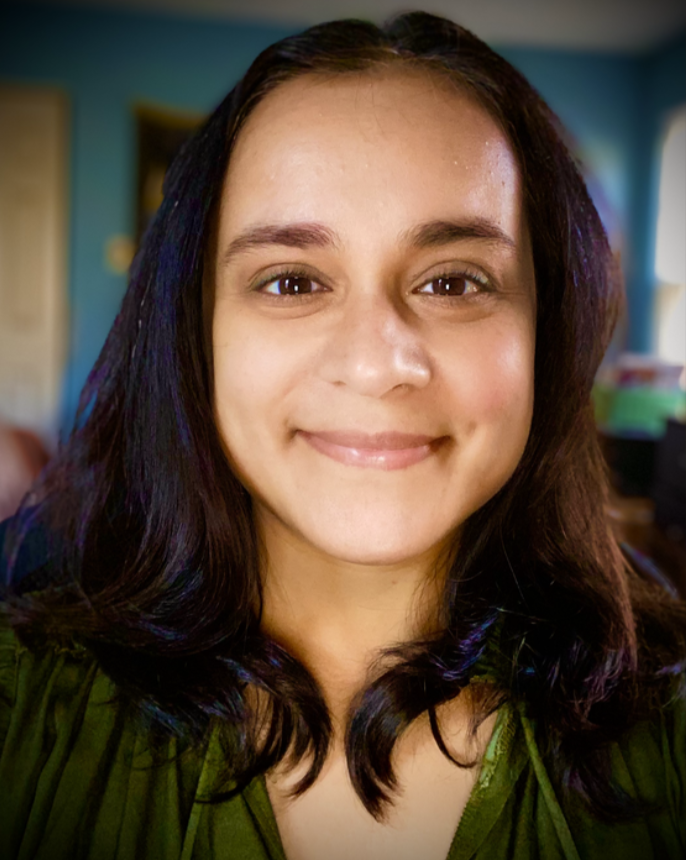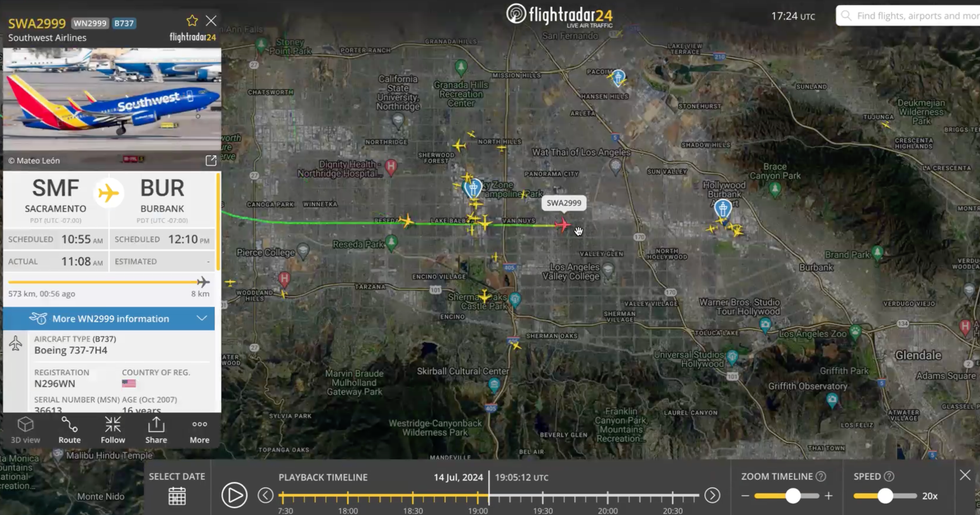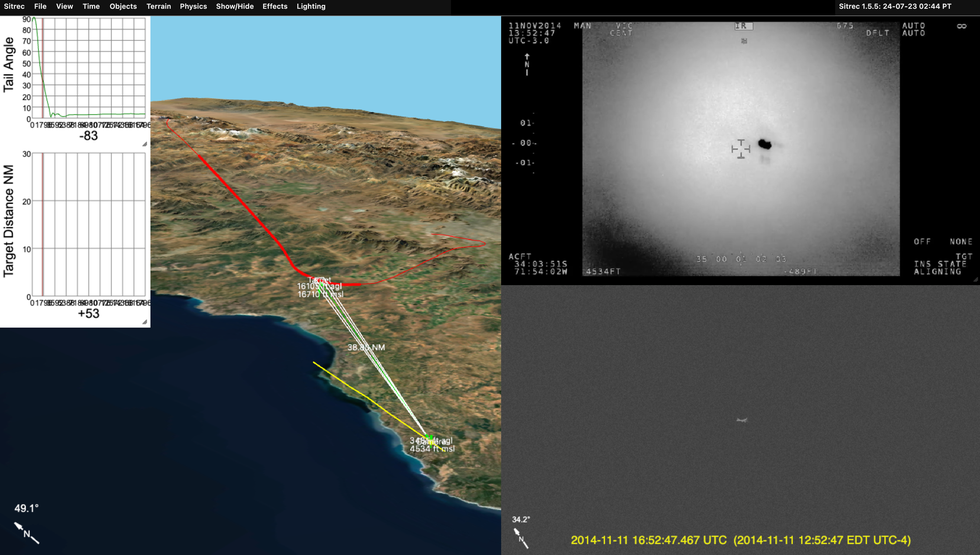UFO Sightings Are Spiking. This Man Has Unraveled the Truth Behind Hundreds of Them
ON A CLEAR, SUNNY DAY IN JULY, Mick West, a former video game programmer, was flying from his home in Sacramento, California, down to Pasadena. From the aircraft, he spied a small, white, elongated object that seemed to be passing over the mountains. Intrigued, he took a short video with his phone. Though he assumed the anomaly was just another airplane, West just couldn’t help himself; he needed to investigate.
When he got to his hotel room, West did what he so often does: a bit of digital sleuthing. First, he uploaded the raw footage to Photoshop to drill down into the image until it resembled a mosaic of zoomed-in pixels. “You have to be very careful about what you’re looking at … for me, that’s the very first step in investigating a case,” he explains. He also downloaded the GPS routes of his plane and a few nearby ones from FlightAware.com, a real-time worldwide flight tracker.
West is a longtime UFO investigator. Retired from the gaming industry in the early 2000s, he’s dealt with about 1,000 UFO cases over nearly a decade, ultimately completing a deeper analysis of about 100 on a pro-bono basis. He examines scoops from official and leaked government reports, sightings trending on social media, emails people send to him, and anomalies posted on popular UFO databases like Enigma and MUFON. He’s even appeared on a History Channel show, The Proof Is Out There, as a forensic video analyst.
He’s found that most skyward curiosities have a logical explanation. No aliens required.
And yet, reports of Unidentified Anomalous Phenomena (UAPs)—a term the U.S. government’s National Defense Authorization Act of 2023 established to replace the term “UFO”—are on the rise, according to data from the All-Domain Anomaly Resolution Office, established in 2022. West believes in using logic and common sense while investigating such claims. That means following the clues and cross-referencing them with simultaneous events such as flights, weather phenomena like saucer-shaped lenticular clouds, ground camera images, and satellite data from companies like Starlink.
That may not necessarily lead to thrilling discoveries of alien encounters, but for West, chipping away at the puzzle to reveal the truth is enormously satisfying.
WEST USES A THOUGHTFUL, methodical process every time he investigates a UAP. His investigation of the white mystery object spotted during his flight to Southern California is the perfect example.
First, he pulled data from the original video. To do so, West used programs like Invisor, an app that displays and compares technical information about video, audio, and photo files. “You drag in the video and you get all this information, things like the original date it was recorded, the resolution, the frame rates … sometimes you get location as well,” he explains, sharing his screen via Zoom, displaying a long column of dozens of datasets.
Understanding the physical perspective of the camera shot is crucial, too. Since West’s video was taken from an airplane, he consulted the free online tool FlightRadar24. A green and brown map depicting U.S. physical features popped up, dotted with dozens of tiny yellow airplane symbols. “You can figure out what’s actually in the air at a particular time,” West explains.
When he zoomed in on his own flight, West could see exactly where his plane was at the particular time he spotted the mysterious, white airborne object, as well as the positions of every other plane nearby. So, he connected the dots. “I knew I was sitting on the right side of the plane,” he says, moving his cursor over another nearby plane, “so this is a likely contender.” He could see that the plane had taken off from Los Angeles’ Van Nuys Airport shortly before his video and that it was ascending. “That matches what we see in the video,” he says.
Then, West turned to a tool he designed himself, called Sitrec. An organization that prefers to remain anonymous paid West to continue developing the app and to help make it freely and publicly available on his website, Metabunk.org, a hub for UAP news, forum discussions, and debunking resources. West simply dragged and dropped his video into Sitrec—a “situation recreation” tool which integrates flight data and video from any source—and used satellite imagery to recreate situations.
“I set the camera to point from my plane to the other two. One of them matched exactly. It was a small Cessna,” he says. “This confirms that this was the plane I was actually looking at.”
WEST USED TO CODE FOR Tony Hawk’s Pro Series™ skater video games, a billion-dollar franchise. He likes to joke that it was his “baptism by fire,” because he would sometimes “spend an inordinate amount of time on this trivial little thing, this one intractable little bug that is just causing this problem. It can be very difficult to figure out … but you have no choice.”
It’s this passion and rigor that ignited his first foray into UAP investigations. That, and a fascination with conspiracy theories.
It all began with the “chemtrails” conspiracy theory that claims airplane vapor trails secretly contain chemical or biological agents meant to control people. To debunk that far-fetched idea, West launched the website ContrailScience.com. Eventually, he started debunking other conspiracy theories including those about 9/11, Earth being flat, and finally UFO alien sightings.
The most important element of maintaining accuracy is to hold on to reasonable—albeit mundane—explanations. “This is a big, big issue in UFO investigations. Instead of trying to eliminate something, you just move possibilities up and down the list,” West explains. Perhaps the list of possibilities for a UAP includes a bird, a weather balloon, an alien spaceship, a hallucination, or a camera glitch. “Which one’s the most important one? The most likely one,” West says. “If you eliminate something, you’ve thrown it away, and you might never get it back.”
That’s what happened during a UAP investigation in Chile—one that would permanently cement West’s interest in UAPs.
In 2014, the Chilean Navy caught video footage of overlapping mysterious black blobs leaving black streaks behind them. Chile’s military studied the recording for two years, but ruled out several different possibilities, leaving behind only the tantalizing chance of aliens. On Metabunk, you can watch West’s analysis of the recording. He discovered that the thermal camera responsible for the footage made the blobs appear hot. In reality, they were just hotter than the surrounding sky that day. Likewise, the streaks were also warmer than the surrounding sky. It’s the same effect as looking through a regular camera at an object with a very bright background, West says—the object appears black.
“It’s not an intuitive thing, and if you don’t delve too deeply into it, [you’ll be wrong,]” he says. In fact, after removing the radiating heat effects around the object, the shape of a regular airplane emerges. The blobs were the four engines of an airplane, and the streaks its contrails.
Another aspect the original investigation got wrong was the blob’s flight path. The footage originated from a helicopter and seemed to indicate a UAP over a nearby bay. “They thought they were looking at an object that was moving left to right, here,” says West, pointing out the flight track path on the video via Sitrec. “In fact, what they were looking at was this plane, just departed from Santiago Airport.” As the plane looped around to gain height over the nearby mountains, it banked in such a way that it appeared to be over the bay and so—apparently—didn’t match any flight records. West was able to simulate the blob’s actual movements by accounting for the camera angle and the relative movement of the blob, and overlaid it successfully with official flight records, matching the paths.
DESPITE HIS DEDICATION, West does have a few unsolved cases on his list. Sometimes, there’s just not enough information to draw a conclusion. For example, in 2017, The New York Times published a video that appeared to depict a flying saucer. West deeply investigated it, checking out how the camera could have been moving, how the UFO could have matched the rotation of the camera, and how there could’ve been a glare in the camera lens. But the analysis took West a long time, and the case is still puzzling. Ideally, West needs the original radar data instead of the analysis the government actually released. The original would have allowed him to recreate the scenario in three dimensions.
“In most cases, what you really want is to have two videos from two different angles. Multiple sensor data is kind of the gold standard,” he explains.
Now that the National Defense Authorization Act requires the government to declassify many UAP documents, West hopes he can get his hands on more original evidence. So far, it’s been a slog, and until there’s fuller disclosure of past UAPs, some of those cases will likely remain open.
Not all of West’s investigations take place on a computer, though. Sometimes he needs to do a little detective work on the side. Once, when somebody reported to him that they’d seen mysterious lights in the sky, West followed his hunch that they might be searchlights and called the local town. He was right: a tree farm in the suspicious location had just installed attention-grabbing searchlights.
Even though West has solved many UAP analysis requests over the years, his conclusions—so far, always mundane—can be unwelcome. People want to believe extraterrestrial aliens are making contact with us. And in the rush to find answers, even other investigators often jump to the wrong conclusions, he says.
There’s also this fact: “The people who are into UFO investigations are so interested because they’re looking for something extraordinary,” West says. “I’m just looking to find out what something actually is, whether it’s extraordinary or not. I don’t have a preference.”

Before joining Popular Mechanics, Manasee Wagh worked as a newspaper reporter, a science journalist, a tech writer, and a computer engineer. She’s always looking for ways to combine the three greatest joys in her life: science, travel, and food.




